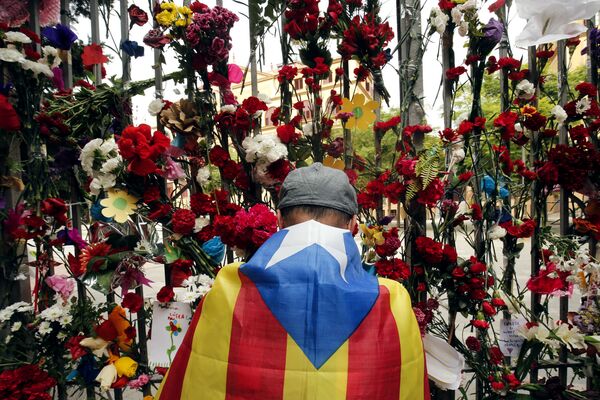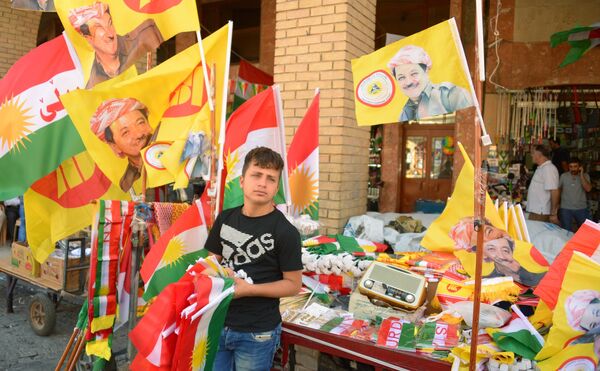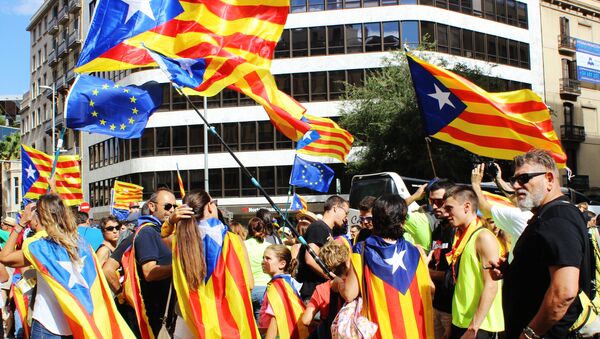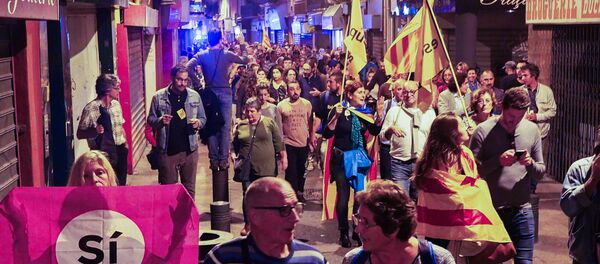The Catalan independence referendum that took place on October 1 has prompted serious tensions within Spain; according to Karel Vereycken, editor of Nouvelle Solidarite, vice president of the Solidarite & Progres political movement and former spokesman of French presidential candidate Jacques Cheminade, Madrid has good reason to be in a "panic mode."
"The Spanish National Bank in its September report said the Spanish state has injected 54.3 billion euros of public funds into the rotten banks. So far, only 3.8 billion has been reimbursed by the banks, while another 10 billion remain expected to flow back in the coffers of the state. However, this means Spanish taxpayers paid 40 billion euros to save fraudulent stealing banks in order to save the euro system!" Vereycken told Sputnik.
Under these circumstances the prospect that Catalonia, which accounted for 19 percent of Spain's gross domestic product (GDP) last year, would start harvesting its own taxes — as the Basks are already doing — is Madrid's nightmare, the French politician underscored.
The Spanish government refused to recognize the vote while police moved in to shut down polling stations, triggering violent clashes with protesters and voters on October 1. While the EU signaled its full support to Madrid, Catalonia's President Carles Puigdemont announced that the region would declare independence in the coming days.
'Madrid Could Organize a Real Referendum for Catalans'
On October 6 Catalonian officials finally announced that 90.18 percent of Catalans (over 2 million people) voted in favor of independence from Spain.
However, according to Vereycken, the situation is not as clear as it seems: "There is no way to really know how many people voted and for what, since everything became a big happening," he said, adding that "voter identities were not checked, schools were closed, people were voting in the streets" while some them didn't go to vote "out of fear."
Commenting on ways to solve the Spanish political crisis he assumed that "Madrid could organize a real referendum in Catalonia in the presence of international observers." He called attention to the fact that "it worked in Scotland, where the secessionists failed."
"If the people of Catalonia decide otherwise, it should be a peaceful process, similar to the Czech Republic," the politician explained, referring to the bloodless dissolution of Czechoslovakia in 1993.

'The Breakdown of Nations': Leopold Kohr's Old Plan Taking Shape in Europe
Still, there is more to the Catalan independence vote than meets the eye, according to the French expert.
"Beyond the egos and schemes of some local politicians, the timing makes me believe this is a trial balloon of a new mode of chaos management organized from the top," he said.
In his 1941 article "Disunion Now: A Plea for a Society based upon Small Autonomous Units" the economist insisted that Germany, France, Italy, Russia and other countries should be "cantonized."
According to Vereycken, it appears that Kohr's plan is currently taking shape in Europe.
"For the hardcore Europeanists the large historical nation-states of Europe have to be broken up into smaller entities of about 5 to 8 million inhabitants in order to get the European population into accepting a EU empire-like supranational super state. That fits Catalonia, Flanders, Scotland, Lombardy, etc.," he pointed out.
"They wanted to break the back of [French general and statesman] Charles de Gaulle who always opposed a federal Europe comprised of 'regions' and defended a Europe 'from the Atlantic to the Urals,' as an alliance and cooperation of sovereign nation-states," Vereycken emphasized.
For their part, the British leaned toward the "divide and conquer" plan "to transform Europe into a buffer state they could manipulate in their great chess game of geopolitics against Russia and the rest of Eurasia."
Rise of BRICS, China-Led New Silk Road Project Spell Trouble for Globalists
According to the politician, the rapid rise of the BRICS and the implementation of the China-led New Silk Road project prompted the global financial oligarchy "to do everything to destroy what is the main source of resistance to their globalist agenda: the nation-states."
Vereycken cited the 2016 article published by the Spanish newspaper Lavanguardia, which drew attention to the fact that George Soros's Open Society Foundation was financing the Catalan secessionists.
"Madrid has shown a lot of interest in joining the New Silk Road and might be for that reason a target for destabilization," he suggested.
"If Catalonia left Spain, the EU establishment would undoubtedly, after a short screaming session, offer what it needs to survive: a market (the EU) and a currency (the euro)," he noted.
The French politician underscored that "the systematic weakening of the national borders and prerogatives by Brussels' bureaucracy has worked as an incentive for 'state-less nations' to leave the national states."
"Most European cities and megalopolises have already their own dirty secret deals with Brussels, outside any national framework," he remarked.
Kohr's idea turned out to be contagious: "In 2004, another book, titled the Size of Nations, written by Alberto Alesina and Enrico Spolaore, also promoted the insane idea that economic integration under a single currency offers all the conditions for the breakup of nations," Vereycken said.
The French politician warned that once this process "proves successful" in the EU, "it would of course be offered to China and the Russian Federation."

Are Catalonia and Iraqi Kurdistan Pawns in a Geopolitical Game?
European secessionism is not a unique phenomenon: The same process could now be observed in the Middle East, where the Kurds are seeking to create sovereign entities in war-torn Syria and Iraq.
"[Iraqi] Kurdistan is a tragedy, a country and a people that have been endlessly manipulated in geopolitical games," Vereycken noted commenting on the issue.
Citing the fact that Israel endorsed the Iraqi Kurds' independence referendum, which took place on September 25, just six days before the Catalan vote, the French expert assumed that "some folks in Tel Aviv, followers of the British geopolitical paradigm, prefer a 'balkanized' Iraq and a 'balkanized' Iran."
"The global financial crash is on," the politician pointed out, "Those on top want a new dark age of mutual slaughter and endless division."
According to Vereycken, the alternative — including for Israel and Iraqi Kurdistan — "is to be part of a vast project of win-win mutual development as proposed by those, in Central Asia and China, promoting the One Belt One Road New Silk Road infrastructure connectivity."
"'If you want to get rich, build a road,' says the Chinese proverb," the French politician concluded.
The views expressed in this article are solely those of the author and do not necessarily reflect the official position of Sputnik.





